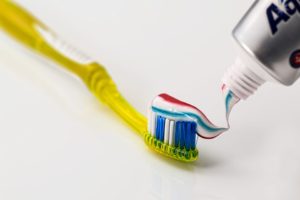Dentist Near Me

X-rays, or radiographs, have long been used in dentistry. Traditional film x-rays are a safe and effective part of your dental care, but they do require a small amount of radiation. In our office, we utilize digital x-ray technology that provides the benefits of film imaging but uses up to 80% less radiation. With our advanced digital radiographs, we can view your teeth and surrounding structures with remarkable accuracy.
Unlike traditional x-rays, digital x-rays require no wait time for film to develop. Instead, the images are available on the computer screen within seconds. These images can then be enhanced and enlarged for more accurate diagnosis. Digital x-rays can be stored, printed, or even transmitted electronically to a specialist or laboratory, if needed.
Intraoral x-rays create an image of the teeth, bone, and tissues inside the mouth. This image can be used for prevention, diagnosis, and/or treatment planning, depending on the need. X-ray images can be used to identify or diagnose potential oral health issues that may not be fully visible to the naked eye. Some of these may include:
- Tooth decay
- Cracks or fractures
- Impacted teeth
- Tooth root infection
- Bone loss
- Cysts, tumors, or other abnormal growths
How often you need dental x-rays will change over your lifetime. Healthy adults may only need radiographs taken every 2-3 years. Children and teens often need more frequent imaging to monitor the growth and alignment of their teeth. However, there are several additional factors that can influence how often digital x-rays are recommended. Some of these include:
- Multiple dental restorations
- Periodontal disease
- Dry mouth
- Tobacco use
- Orthodontics
- Root canal therapy
Your safety is our primary concern. Before having a digital x-ray taken in our office, let us know if any of the following apply to you:
- You have had a dental x-ray in another office within the past year
- You are or may be pregnant
- You have any questions or concerns about x-rays
For more information on how our digital x-rays benefit you, contact our office.
7615 W. Montrose Ave.
Norridge, IL 60706-1045
Phone: (708) 453-0777



 Along with cooler weather and the end of year school break, winter brings the return of cold and flu season. When you are focused on a child with a fever, cough, or vomiting, it can be easy to question getting them out of the sickbed to brush their teeth. However, keeping mouths clean and teeth healthy can be even more important during illness. Here are some useful tips for protecting your child’s oral health when they’re sick.
Along with cooler weather and the end of year school break, winter brings the return of cold and flu season. When you are focused on a child with a fever, cough, or vomiting, it can be easy to question getting them out of the sickbed to brush their teeth. However, keeping mouths clean and teeth healthy can be even more important during illness. Here are some useful tips for protecting your child’s oral health when they’re sick. When buying a toothbrush, toothpaste, or coming in to our office, you often hear the word “plaque” associated with the health of your teeth. Plaque is one of the main reasons why it is so important to keep up with a daily oral hygiene routine that includes brushing two times each day for at least two minutes, and flossing regularly as well. Here’s what you need to know about plaque and what it can do to your smile.
When buying a toothbrush, toothpaste, or coming in to our office, you often hear the word “plaque” associated with the health of your teeth. Plaque is one of the main reasons why it is so important to keep up with a daily oral hygiene routine that includes brushing two times each day for at least two minutes, and flossing regularly as well. Here’s what you need to know about plaque and what it can do to your smile. If the idea of biting into an ice cream sandwich makes you cringe, you may be one of the millions of people who suffer from sensitive teeth. This is often caused by movement of fluid in the dentin – the soft inner tissue beneath the enamel of your tooth. This motion irritates the tooth nerve, creating a tingling sensation and sometimes pain.
If the idea of biting into an ice cream sandwich makes you cringe, you may be one of the millions of people who suffer from sensitive teeth. This is often caused by movement of fluid in the dentin – the soft inner tissue beneath the enamel of your tooth. This motion irritates the tooth nerve, creating a tingling sensation and sometimes pain. Due to the anxiety or embarrassment it can cause, halitosis – or bad breath – can be difficult for many people to face. However, clean-smelling breath may be easier than you think. Try these solutions to overcome halitosis and regain your confidence.
Due to the anxiety or embarrassment it can cause, halitosis – or bad breath – can be difficult for many people to face. However, clean-smelling breath may be easier than you think. Try these solutions to overcome halitosis and regain your confidence. Most serious oral health issues can be prevented by maintaining an effective routine of dental hygiene and in-office care. However, you could be at higher risk for some oral illnesses due to hereditary factors. Awareness and proper treatment can help minimize these risks. Here are a few of the most common oral health concerns that are affected by genetics.
Most serious oral health issues can be prevented by maintaining an effective routine of dental hygiene and in-office care. However, you could be at higher risk for some oral illnesses due to hereditary factors. Awareness and proper treatment can help minimize these risks. Here are a few of the most common oral health concerns that are affected by genetics. Your smile is one of the first things a person will notice when you meet. If you would like to improve your smile with a simple procedure, teeth whitening may be a great option for you, especially if you have stained, dull or discolored teeth. Our dental office is providing teeth whitening services to new and existing patients.
Your smile is one of the first things a person will notice when you meet. If you would like to improve your smile with a simple procedure, teeth whitening may be a great option for you, especially if you have stained, dull or discolored teeth. Our dental office is providing teeth whitening services to new and existing patients. Do you brush your teeth after lunch? If you’re one of the millions of people who work outside the home, chances are you don’t have the time or resources to brush during the day. However, not being able to brush doesn’t mean you can’t protect your teeth at work.
Do you brush your teeth after lunch? If you’re one of the millions of people who work outside the home, chances are you don’t have the time or resources to brush during the day. However, not being able to brush doesn’t mean you can’t protect your teeth at work. Are you embarrassed to show your smile because of missing teeth? For many people, missing teeth can create a feeling of diminished self-confidence. Modern dentistry can not only replace the gaps in your smile, our team can also create long-term replacements that look and feel just like your natural teeth. You have options. Here are a few of the most common tooth replacement solutions.
Are you embarrassed to show your smile because of missing teeth? For many people, missing teeth can create a feeling of diminished self-confidence. Modern dentistry can not only replace the gaps in your smile, our team can also create long-term replacements that look and feel just like your natural teeth. You have options. Here are a few of the most common tooth replacement solutions.